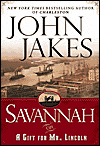 Lucky for me, the last few books I've received as gifts (of which Savannah is one) have all been very good. Savannah is not the sort of book I probably would have picked up on my own, so I'm doubly glad to have got it (was it for my birthday? Or Christmas?). Thanks, Mom and Dad!
Lucky for me, the last few books I've received as gifts (of which Savannah is one) have all been very good. Savannah is not the sort of book I probably would have picked up on my own, so I'm doubly glad to have got it (was it for my birthday? Or Christmas?). Thanks, Mom and Dad!I've never read John Jakes, though I've thought about picking up Charleston once or twice. I probably will. This is a very simple little story, a fast read, but rather exciting nonetheless. The cast of characters is wide but ably drawn, and with a handful of exceptions are brought together well at the end. I read most of this book this afternoon; it's not a particularly weighty tome, but it isn't meant to be. It's the sort of thing you could read in a few days at Christmastime, and I think that's what was intended. (More after the Jump.)
The story centers around a young girl named Hattie Lester, and the family cobbled together around her. She and her mother share duties at a dried up old plantation on the outskirts of Savannah. They flee into the city to stay with a friend as Sherman's troops approach the city, and the story plays out around and through those desperate circumstances.
The book takes in over a dozen separate plot lines, which is a lot to manage. This can be a bit confusing in the early going, keeping everyone straight. Once the action moves into Savannah along with the Union army, the book picks up substantially. I'll wager you probably won't want to put it down once Gen. Sherman himself makes his appearance.
Of course, by the time you've got a third of the book left, you have a pretty good idea how it's all going to play out in the end. The question that keeps you reading is, how exactly is Jakes going to get us there? It's well worth the journey.
My main criticism would be that one of the plotlines is deemed so frightfully unimportant as to not warrant resolution at the end of the book. This little plotline seems to stem from a need to allow young Hattie to visibly irritate her relatives early on in the story; Jakes returns to it only two or three times, taking the time to flesh out a backstory on a sympathetic character, but come the end of the book the story is left open. Hopeful, but open. I question the need for it, but this is minor.
Gen. Sherman is almost sympathetic here, which is saying something because of all individuals I've studied from that era, Sherman comes the closest to having a heart of pure evil. I'm not saying I need to reevaluate my impression of him, only that Jakes has done a good job here.
This is a very charming little story, and as the Christmas season is approaching and it's coming out in paperback, it's probably worth picking up.
No comments:
Post a Comment